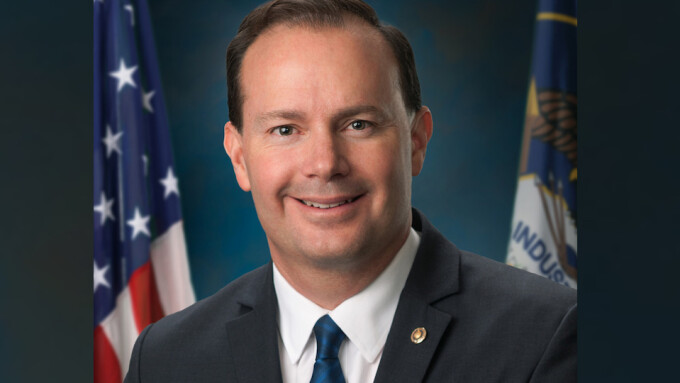WASHINGTON — The U.S. Congress’ top anti-porn crusader, Utah Senator Mike Lee, introduced a bill last week that would effectively outlaw all sex work in the nation, including adult performance and content creation, by classifying any consent influenced by a person’s economic circumstances as coercive.
The Republican calls S 3178, the bill he introduced on Jan. 31, the “Preventing Rampant Online Technological Exploitation and Criminal Trafficking Act of 2024” or the “PROTECT Act.”
The bill’s definition of “coerced consent” goes beyond traditional understanding of the term, encompassing “purported consent obtained from a person: through fraud, duress, misrepresentation, undue influence, or nondisclosure; who lacks capacity; or though exploiting or leveraging the person’s immigration status, pregnancy, disability, addiction, juvenile status, [or] economic circumstances.”
FSC Director of Public Affairs Mike Stabile posted on X that the bill would effectively make it a crime to pay an adult performer.
“Consent would be invalidated if ‘economic circumstances’ — like paying rent — was a motivating factor to work,” Stabile noted.
“This is, of course, the dream of the faith based ‘anti-trafficking’ folks — and SWERFs — who believe that no true consent can exist for sex work when money is involved,” Stabile added. “It would essentially codify their white slavery panic into law.”
The “Findings” section introducing Lee’s PROTECT Act presents as facts several myths and broad generalizations originating from religiously motivated anti-porn crusading groups, and urges the government to establish a regulatory system that would effectively act as a state censorship office exclusively for adult content.
As XBIZ reported, last week Lee attempted to draft singer Taylor Swift to support his PROTECT Act by blurring the distinction between nonconsensual deepfakes and consensual adult content.
“Hi @taylorswift13 and @treepaine,” Lee posted on X. “I have legislation to help get harmful deepfake images removed quickly, and create a way for people to sue companies that don’t take them down. I’m re-introducing the PROTECT Act next week. Would love your support!”
Turning a Religious Obsession With Sex Into Federal Law
In November, Lee reintroduced a proposal for a federal age-verification law, the SHIELD Act, which would expand Utah’s anti-porn legislation, promoted by religious conservatives, to the entire United States.
As XBIZ has been reporting, leading conservative anti-porn crusaders have admitted that the state-by-state age verification laws they have been sponsoring throughout the country are merely a stepping stone in an organized effort to ban all adult content online and revive obscenity prosecutions.
In 2022, Lee introduced the Interstate Obscenity Definition Act (IODA), a bill that nominally aimed to “establish a national definition of obscenity” but which would, in effect, outlaw all online sexual content nationwide.
The United States does not currently have a national definition of obscenity. Jurisprudence has established the Miller Test, which has been a legal standard in federal courts for a half-century. According to a statement from Lee’s office, however, the Utah senator believes that it is time to revisit those standards, set in 1973, under which the production and distribution of sexual content have been legal in the United States.
According to Lee, “The Supreme Court has struggled to define obscenity, and its current definition under the ‘Miller Test’ runs into serious challenges when applied to the internet.”
Lee is a member of the Church of Jesus Christ of Latter-day Saints, which sees sexual content as a ploy by Satan to destroy Mormon households by tempting Mormon men — a view that appears to be central to Lee’s obsessive anti-porn lawmaking. In Utah, the separation of church and state is in practice a gray area, as devoted church members occupy virtually every leadership position in government, the legal system, education and business. Moreover, the majority of all male Mormon officeholders are also clergy in the LDS Church.







